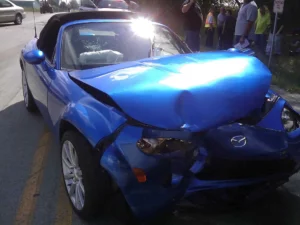Verdict in Favor of Car Accident Victim Upheld in Florida Fourth District Appellate Decision

In any personal injury case, the injured person must connect the accident to the alleged injury in order to receive damages. The Florida Fourth District Court of Appeal recently assessed in a Florida car accident case, No. 4D17-1900, whether it was an error for the trial court to allow an expert witness for the injured person to testify about causation and permanency in violation of a trial preparation order. The plaintiff sought damages for the bodily injuries she sustained due to an accident. The driver of the other vehicle admitted fault but denied the accident caused the victim’s alleged injuries. The case moved forward to trial to determine whether the accident did cause her injuries, whether those injuries are permanent, the reasonableness and necessity of medical bills, and damages.
The defendant objected to one of the injured person’s expert witnesses, an orthopedic surgeon, but the court allowed the expert to opine on the causation and permanency of the plaintiff’s injuries. The surgeon testified the injured person’s shoulder was damaged as a result of the car accident and required surgery. The physician described his course of treatment and provided copies of the total bill of $58,000 from his practice group. The injured person also testified, discussing the multiple treatments she received to remedy the injuries from the accident. The injured person went to an urgent care facility on the day of the accident to address pain and stiffness in the back of her neck and a numbing sensation starting at her shoulders and reaching through her arm to the fingertips. The injured person additionally described seeking help for several months when she went to physical therapy and underwent an MRI. Eventually, surgery was recommended by two separate physicians. The injured person testified she underwent the procedure and had to follow up with additional post-surgical care to improve her strength and ability.
On appeal, the defendant asserted the trial judge erred in the dismissal of his motions because there was insufficient evidence about the reasonableness and necessity of past services provided for the injured person’s medical care. Florida requires an injured party to produce more than the mere bill for expenses to prove whether the amount was reasonable. The defendant argued the physician’s testimony was unnecessary to show the necessity and reasonableness of the bill, but the injured person’s lay testimony was acceptable. The defendant claimed that since there was no testimony from the injured person connecting each bill to the accident, there was no testimony meeting the burden set by Florida statutes and case law. The appellate court was unpersuaded by this argument and concluded the plaintiff sufficiently proved the reasonableness through her testimony and her expert’s testimony.
The defendant additionally asserted the injured person’s witness was not properly disclosed per the trial preparation order issued earlier in the proceeding. This order required the parties to disclose their expert witnesses 90 days prior to trial and include information about their witnesses. Per the order, failing to do so meant the exclusion of a witness at trial. The injured person filed disclosures in response to the order with two amendments. The surgeon did not appear as an expert on either list, and his curriculum vitae was left out, but he was listed in conjunction with a records custodian or representative of his office. Her response stated that the testimony was expected to discuss the history, examination, diagnosis, treatment, prognosis, permanency, and reasonable and necessary charges for services.
The Florida Supreme Court previously held a trial court can properly exclude the testimony of a witness whose name has not been disclosed in accordance with a pretrial order. The discretion is broad but not blind, and the court must weigh whether the use of an undisclosed witness would prejudice the other party. The appellate court determined this did not reach the level of abuse of discretion by the trial court, even though it acknowledged the injured person did not comply with the court’s order. The verdict was affirmed, and the award for the injured person remained intact.
The Florida car accident attorneys at Weston & Pape will aggressively pursue all of the damages you are entitled to receive under the law. Call our office today at 772-266-555 or 561-299-3999 for a free, confidential consultation.
More Blog Posts:
Florida District Appellate Court Reviews Future Medical Expenses in Multi-Car Accident Case, Florida Injury Lawyer Blog, November 28, 2016
Federal Circuit Court of Appeal Declines to Find Equitable Tolling in Slip and Fall Case, Florida Injury Lawyer Blog, October 21, 2016
Florida Court of Appeal Allows Injured Motorist to Pursue Additional PIP Payments to Medical Providers, Florida Injury Lawyer Blog, May 18, 2017

 Call Us Today
- It's Free
Call Us Today
- It's Free